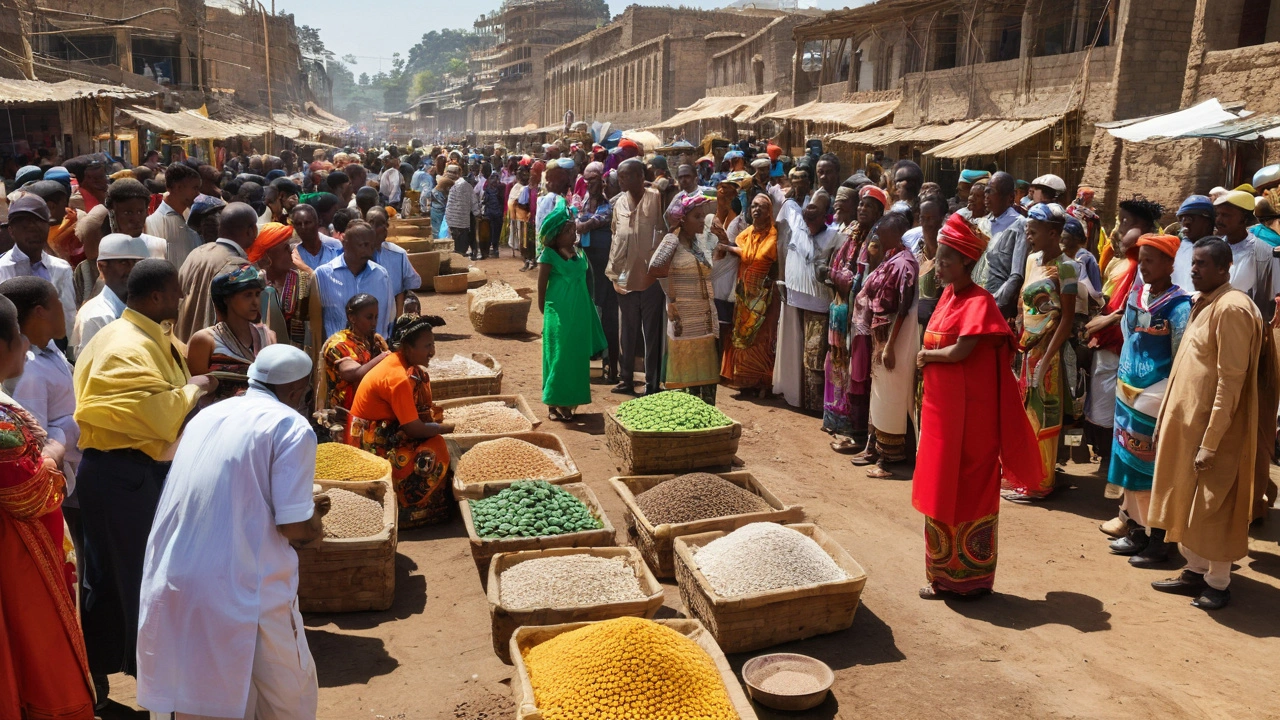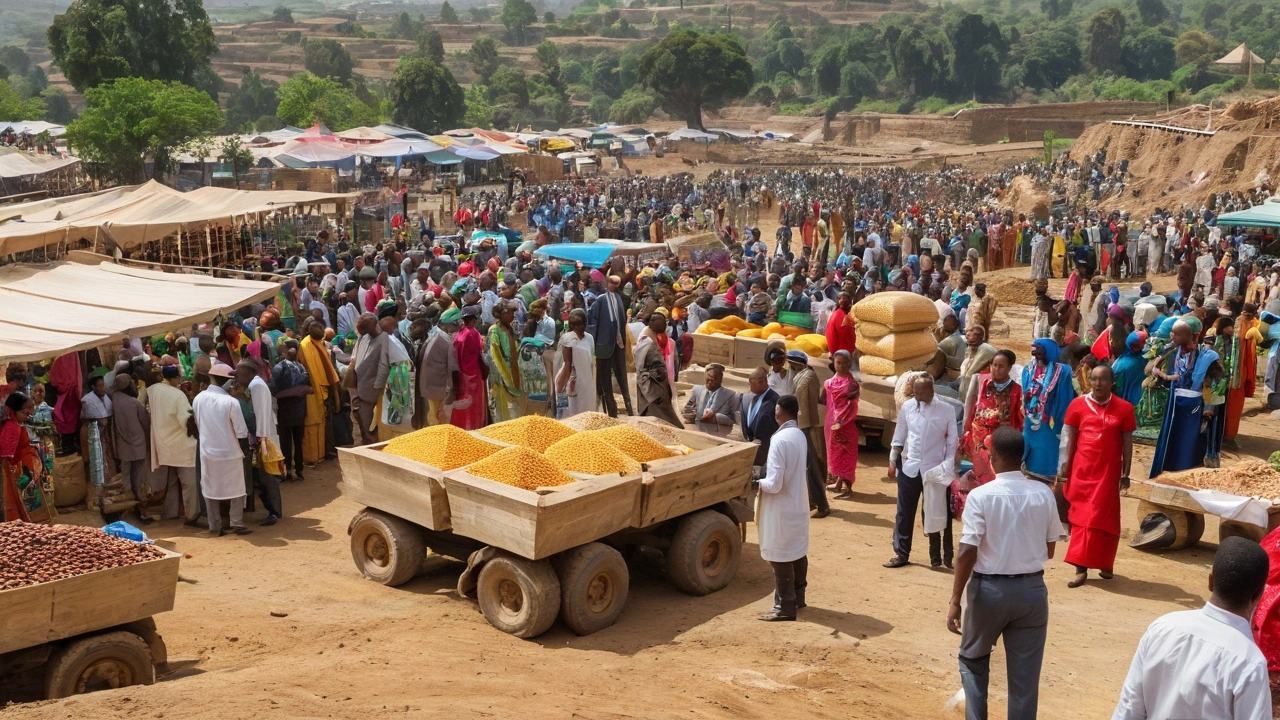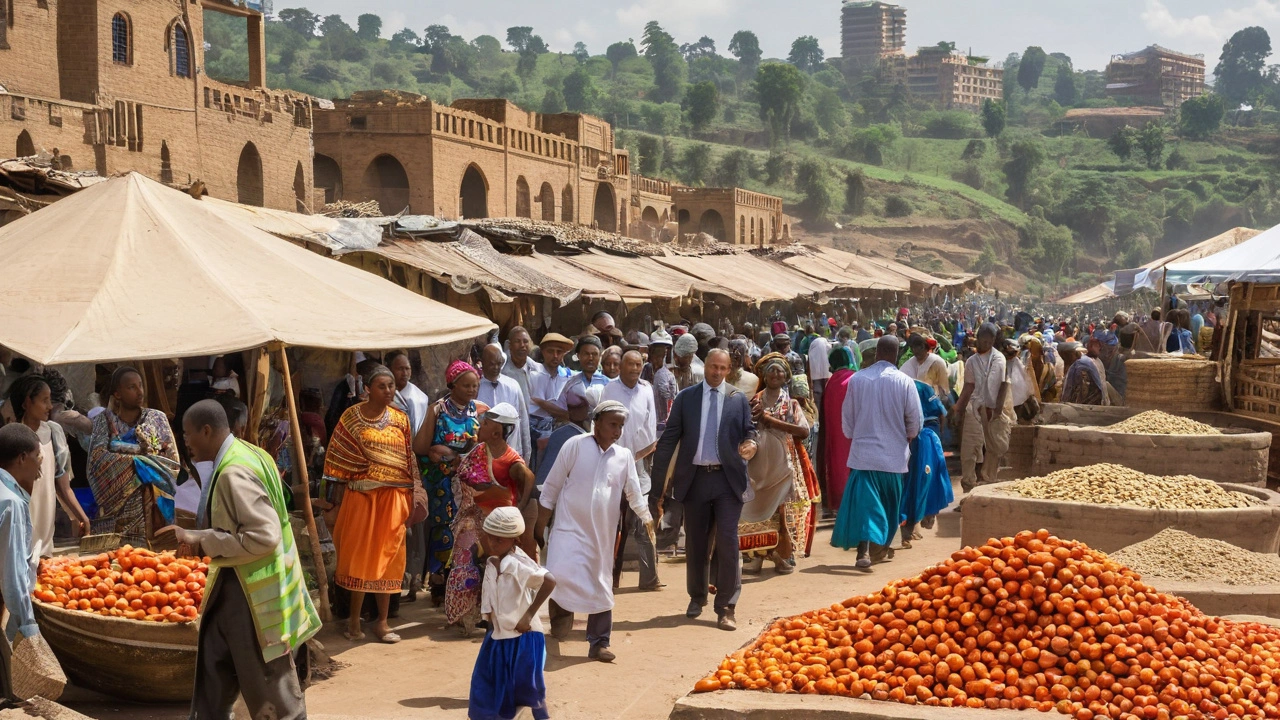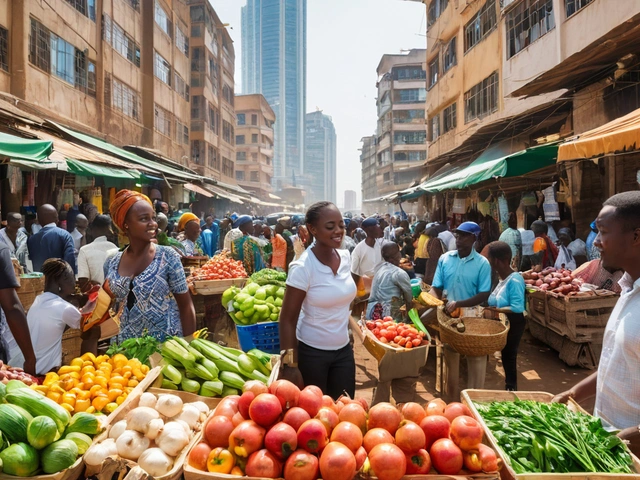For those considering investing in Africa, Ethiopia stands out as a country brimming with potential. Its rapid economic growth and ambitious development plans have caught the eye of global investors.
But is Ethiopia really a good place to invest? The article dives into the nation's economic stability, highlights key sectors ripe for investment, and provides an insight into government policies favoring business ventures.
You will also get a clear picture of the advantages and opportunities that await, alongside the challenges and risks that every potential investor should consider. Understanding these dynamics can help you make an informed decision about where to place your investments in Ethiopia.
- Economic Growth and Stability
- Key Investment Sectors
- Government Policies and Incentives
- Advantages and Opportunities
- Challenges and Risks
Economic Growth and Stability
In recent years, Ethiopia has emerged as one of Africa's fastest-growing economies. With annual GDP growth rates of approximately 8-10% over the past decade, it has been a shining example of a developing nation making significant strides forward. The capital, Addis Ababa, has transformed into a bustling metropolis, reflecting the broader economic growth seen across the country.
A driving force behind this growth has been the agricultural sector. Known for its vast arable land, Ethiopia is one of the world's largest producers of coffee. This sector alone accounts for nearly 80% of the country's exports. Combined with livestock, the agricultural industry employs over 70% of the population, providing a stable backbone to Ethiopia's economic structure.
"Ethiopia's economic performance has been nothing short of remarkable," noted the World Bank in its latest report on African economies. "With sustained commitment to reform and investment, the country has the potential to become a middle-income economy within the next decade."
Infrastructure Development
The Ethiopian government has made considerable investments in infrastructure, recognizing it as a critical element for continued economic growth. One of the most significant projects is the Grand Ethiopian Renaissance Dam (GERD), which, once completed, will be Africa's largest hydroelectric power plant. This project is expected to transform Ethiopia into a regional energy hub, providing electricity to neighboring countries and fueling domestic industries.
In addition, the Ethiopian government has been actively improving transportation networks. The Ethiopian Airlines, the nation's flagship carrier, has established itself as Africa's largest and most profitable airline, connecting Ethiopia to key global markets. The development of a modern railway linking Addis Ababa to Djibouti has also enhanced trade efficiency, reducing transportation costs and facilitating easier access to international markets.
Political Stability and Reforms
Political stability is another pillar supporting Ethiopia's economic growth. Over the past few years, the Ethiopian government has undertaken significant political reforms aimed at promoting democracy and peace. These reforms have played a vital role in creating a conducive environment for investment, instilling confidence among international investors.
The introduction of the Homegrown Economic Reform Plan in 2019 marked a critical turning point. This ambitious plan aims to address macroeconomic imbalances, stimulate the private sector, and enhance the business climate. The government’s focus on initiating privatization of major state-owned companies such as the telecom giant Ethio Telecom indicates a shift towards a more market-oriented economy. This opening up of previously public-only sectors offers unique opportunities for investors seeking entry into the Ethiopian market.
Challenges to Watch
Despite these developments, challenges remain. Inflation rates have been high, occasionally soaring into double digits, which can impact purchasing power and affect household savings. Additionally, regional conflicts and political tensions, particularly in the northern Tigray region, pose risks to stability. Prospective investors must stay attuned to these dynamics and evaluate how they might influence their investments.
In conclusion, Ethiopia’s robust economic growth, coupled with significant infrastructure projects and political reforms, creates a compelling case for investment. However, potential investors should remain aware of the challenges and risks, ensuring they make informed decisions.
Key Investment Sectors
Investing in Ethiopia presents a plethora of opportunities, especially in certain vital sectors. Over the last decade, the country's focused development plans have identified several key areas for investment. One cannot ignore the potential in the agricultural sector, which remains the backbone of Ethiopia's economy. With vast arable lands and a favorable climate, the country is a leading producer of coffee, flowers, and other cash crops. The government encourages investment in this sector by providing incentives such as tax breaks and easy access to land.
Beyond agriculture, the manufacturing sector in Ethiopia is growing at an impressive rate. The establishment of industrial parks across the country has played a pivotal role in fostering this growth. These parks offer state-of-the-art infrastructure and serve as hubs for both local and international manufacturers. The textile and garment industry, in particular, has seen significant foreign investment, largely due to affordable labor costs and government support. With the ease of import-export operations, this sector holds substantial promise for investors.
The energy sector is another booming area. Ethiopia is endowed with enormous renewable energy resources, particularly hydroelectric power. The Grand Ethiopian Renaissance Dam (GERD) is a testament to the country's commitment to becoming a regional power hub. This project, when completed, is expected to generate over 6,000 megawatts of electricity. The government has also opened doors for private investment in other renewable sources such as wind, solar, and geothermal energy. This diversification ensures a stable energy supply essential for sustainable economic growth.
Tourism is yet another sector with untapped potential. Home to a rich cultural heritage and numerous UNESCO World Heritage Sites, Ethiopia offers a unique travel experience. The government has prioritized the development of infrastructure to boost tourism. Investments in this sector are lucrative as the country aims to increase visitor numbers. With the construction of new hotels, resorts, and recreational facilities, tourism is set to become a major revenue generator.
According to a statement from the Ethiopian Investment Commission, “Ethiopia's strategic location, favorable business climate, and government incentives make it an attractive destination for investors.” This is evident in the commitment to modernize the transportation and logistics sectors. New projects like the Addis Ababa-Djibouti Railway and the expansion of the Addis Ababa Bole International Airport are part of efforts to improve connectivity and facilitate smoother trade operations.
It is worth mentioning the information and communication technology (ICT) sector, which is showing rapid growth. The liberalization of the telecom industry, with new licenses being granted to private operators, is revolutionizing the sector. Investments in internet infrastructure and tech startups are set to transform Ethiopia into a digital economy, opening new avenues for innovation and entrepreneurship.
The mining sector also deserves attention. Ethiopia is rich in mineral resources like gold, tantalum, and potash. The government is actively encouraging foreign investment in mineral exploration and mining operations through regulatory reforms and incentives. This sector has the potential to significantly bolster the country's economic landscape.

Government Policies and Incentives
Ethiopia's government has taken significant steps to create an attractive environment for investors. These include a range of policies and incentives designed to stimulate economic development and encourage foreign investment. Over recent years, Ethiopia has positioned itself as one of the fastest-growing economies in Africa, partly due to its proactive approach in removing barriers and providing favorable conditions for business.
One of the most notable incentives is the tax holiday scheme. The Ethiopian government offers a tax exemption for up to five years for new enterprises, depending on the industry and location. This policy aims to reduce the financial burden on startups and encourage the establishment of new businesses in strategic sectors like manufacturing, agriculture, and technology. According to the Ethiopian Investment Commission (EIC), these incentives have been instrumental in attracting over $10 billion in foreign direct investment (FDI) over the past decade.
Additionally, the government has established several industrial parks across the country. These parks provide ready-made infrastructure, access to utilities, and streamlined bureaucratic processes, which significantly reduce the operational challenges investors might face. The Hawassa Industrial Park, for example, has become a hub for textile and garment manufacturing, attracting major global brands and generating thousands of jobs.
The Ethiopian government has also prioritized bilateral investment treaties (BITs) with multiple countries to protect investors from non-commercial risks. These treaties cover critical aspects like protection from expropriation, fair treatment, and the transfer of profits. BITs are part of Ethiopia's broader strategy to create a stable and predictable investment environment that assures foreign investors of the security of their investments.
Moreover, the government has launched various initiatives to improve the ease of doing business in the country. Measures like reducing the time required to register a business, simplifying customs procedures, and enhancing transparency in regulatory environments are just some of the efforts undertaken in recent years. The World Bank's Doing Business report shows Ethiopia making steady improvements in these areas, although challenges remain.
“Ethiopia is committed to creating a conducive and competitive environment for investors by continuously reviewing and updating its policies,” says Abebe Abebayehu, the Commissioner of the Ethiopian Investment Commission. “We are open for business and committed to sustainable economic growth.”
Customs duties exemptions are another attractive feature for investors. Imported capital goods, construction materials, spare parts, and raw materials can often be exempt from duties, lowering the initial costs for businesses establishing operations in Ethiopia. This policy is particularly attractive for companies in manufacturing and construction, where material costs can be significant.
The “Growth and Transformation Plan” (GTP) of Ethiopia outlines a comprehensive roadmap for economic development, focusing on sectors that drive growth and employment. The GTP highlights the commitment to infrastructure development, health, education, and energy, which are critical for a thriving business ecosystem. The government’s focus on building an extensive network of roads, railways, and industrial zones, along with improving energy production capabilities, has already borne fruit, enhancing the overall investment climate in the country.
In conclusion, Ethiopia’s government policies and incentives are a strong draw for foreign investors. With significant tax holidays, protection treaties, infrastructure development, and policy reforms, the country offers a compelling case for investment. While challenges still exist, the proactive measures taken by the government demonstrate a clear commitment to fostering a welcoming environment for both local and international investors.
Advantages and Opportunities
When it comes to investing in Ethiopia, several factors make it an attractive destination for foreign investments. One of the most compelling advantages is the country’s sustained economic growth. Ethiopia has been one of the fastest-growing economies in Africa. With annual GDP growth rates often hovering around 10%, it has captured the interest of international investors. The nation's large population of over 110 million also represents a sizable consumer market, which is appealing for various businesses.
Agriculture is a key sector in Ethiopia, and it offers significant opportunities for investment. With fertile lands and diverse climatic conditions, the nation is ideal for a range of agricultural activities. Coffee is Ethiopia's most famous export, but there are abundant opportunities in other crops like flowers, fruits, and vegetables. Livestock farming also holds promise. Foreign investors can leverage these opportunities by investing in agro-processing industries and export-oriented agribusinesses.
Another sector that shows immense potential is manufacturing. The Ethiopian government has established several industrial parks to attract foreign investment. These parks provide necessary infrastructure and facilities, making it easier for businesses to set up operations. The manufacturing sector benefits from relatively low labor costs and a growing emphasis on producing goods for export. Textiles, leather goods, and pharmaceuticals are some of the areas receiving significant attention.
"Ethiopia has a government that is quite focused on industrialization and offers attractive incentives for foreign investors," said Dr. Arkebe Oqubay, a senior minister and special adviser to the Ethiopian Prime Minister.
The technology sector is also on the rise. With an increasing number of internet users and a young, tech-savvy population, Ethiopia is becoming a hotspot for tech innovation in Africa. The government is making strides to improve technological infrastructure and is encouraging startups through various incubators and innovation hubs. This fosters a conducive environment for tech entrepreneurs and investors.
Infrastructure development is another area presenting numerous investment opportunities. The Ethiopian government has invested heavily in building and upgrading infrastructure, including roads, railways, and energy projects. Projects like the Grand Ethiopian Renaissance Dam (GERD) are set to boost electricity generation, providing a reliable power supply for industries. Foreign companies specializing in construction, engineering, and logistics can find lucrative projects in Ethiopia.
Supportive Government Policies
Ethiopia's favorable government policies also enhance its attractiveness as an investment destination. Special economic zones, tax holidays, and import duty exemptions are some of the incentives offered to foreign investors. The Ethiopian Investment Commission (EIC) provides active support and advisory services to help investors navigate the local business landscape. The government’s focus on reducing bureaucratic hurdles and improving the ease of doing business has made it simpler for foreign companies to establish and operate ventures in the country.
Moreover, Ethiopia’s strategic location in the Horn of Africa places it in close proximity to some of the world's busiest shipping lanes, facilitating easy access to international markets. The country's membership in regional trade blocs such as the Common Market for Eastern and Southern Africa (COMESA) further enhances its trade prospects, offering tariff-free access to a large regional market.

Challenges and Risks
Investing in Ethiopia does come with a set of challenges and risks that potential investors must be aware of. While the country offers numerous opportunities, understanding the hurdles can help in making well-informed decisions and devising strategic plans to mitigate these risks.
One of the prominent challenges is political instability. Ethiopia has experienced periods of unrest, and while the government is working towards stability, it's essential to stay updated with the current political climate. The internal conflicts can impact business operations, causing delays and increasing costs.
Another significant concern is the bureaucratic and regulatory environment. Navigating the legal aspects of establishing and running a business in Ethiopia can be time-consuming and often complicated. Investors might face issues with obtaining licenses, permits, and dealing with administrative delays, all of which can slow down the investment process. The World Bank's Ease of Doing Business Index, for instance, has placed Ethiopia in a relatively low position due to these bureaucratic hurdles.
"Bureaucracy remains one of the most significant challenges in Ethiopia, but the country is making strides to improve its business environment, noted Jonathan Rosenthal, an expert on African economies."Developing infrastructure is another area that poses hurdles. While Ethiopia has made progressive steps in enhancing its infrastructure, particularly in urban areas like Addis Ababa, rural areas still lag. This can affect logistics, supply chain operations, and access to markets. Poor roads, limited transport options, and unreliable power supply are among the top issues that businesses may face.
Economic Factors
Economic factors like currency fluctuation and inflation also pose a risk to investors. The Ethiopian Birr is prone to depreciation, which can affect profitability, especially for businesses reliant on imports. Inflation rates can also vary, impacting the cost of operations and purchasing power. Investors need to have strategies in place to manage currency risks and inflationary pressures.
Market Size and Competition
The market size in Ethiopia, although growing, is still in its developing stages. This can be a drawback for investors looking for immediate, high-return opportunities. Additionally, competition from established local businesses can be fierce. Understanding the market dynamics and consumer behavior is crucial for entry and long-term success.
Lastly, there’s the issue of skilled labor. While Ethiopia boasts a large and youthful population, there is a considerable skills gap in various industries. Investors may have to invest in training and development, which can be an added cost but is necessary for operational success.
On the brighter side, these challenges are not insurmountable. With thorough research, strategic planning, and a focus on building local partnerships, investors can navigate these risks effectively. By doing so, the potential rewards of investing in Ethiopia can far outweigh the hurdles.

 Navigating Employment Opportunities for Foreigners in Ethiopia
Navigating Employment Opportunities for Foreigners in Ethiopia
 Understanding the Average Salary in Ethiopia: An In-depth Analysis
Understanding the Average Salary in Ethiopia: An In-depth Analysis
 Business Sectors Thriving in Africa: Key Opportunities to Explore
Business Sectors Thriving in Africa: Key Opportunities to Explore
 Understanding the Average Work Week in Ethiopia: Insights and Facts
Understanding the Average Work Week in Ethiopia: Insights and Facts
 Exploring Common Occupations in Ethiopia: Agriculture, Technology, and Beyond
Exploring Common Occupations in Ethiopia: Agriculture, Technology, and Beyond
pradeep kumar
August 4, 2024 AT 17:36Investors love the hype, but the reality on the ground often tells a different story. The promised growth can be throttled by bureaucracy and infrastructure bottlenecks.
love monster
August 4, 2024 AT 17:52Ethiopia's economic trajectory is nothing short of a high‑growth case study for emerging markets.
The GDP expansion rates hovering around double digits over the past decade illustrate a macro‑environment ripe for capital infusion.
From a macro‑analyst perspective, the country’s fiscal deficit has been narrowing thanks to disciplined public spending.
Moreover, the foreign exchange regime has been gradually liberalized, reducing the premium on converting birr to major currencies.
Infrastructure-wise, the Grand Ethiopian Renaissance Dam is set to unleash over six gigawatts of renewable power, a game‑changer for industrial zones.
Coupled with the Addis‑Ababa–Djibouti railway, logistics costs are projected to drop by up to thirty percent, boosting export competitiveness.
The government’s tax holiday scheme, offering up to five years of exemption for qualifying sectors, directly improves after‑tax cash flows for new entrants.
Industrial parks like Hawassa provide plug‑and‑play facilities, alleviating the typical boot‑strapping challenges faced by greenfield projects.
Agriculture remains the backbone, with coffee, flowers, and horticulture presenting high‑value processing opportunities.
Textile and garment manufacturing benefit from the confluence of low‑cost labor and preferential market access under AGOA.
Renewable energy projects beyond hydro-wind farms in the Rift Valley and solar farms in the Somali region-are attracting private equity looking for stable, long‑term yields.
The ICT sector is burgeoning, thanks to recent telecom liberalization, opening doors for data center investments and fintech startups.
Tourism, though under‑exploited, shows strong upside given Ethiopia's rich cultural heritage and UNESCO sites.
Risk management is essential; inflation volatility and occasional political flashpoints require hedging strategies.
Nevertheless, the overall risk‑adjusted return profile compares favorably against peers in the Sub‑Saharan space.
In short, strategic investors who align with the country’s development agenda can tap into a diversified growth engine 🚀.
Christian Barthelt
August 4, 2024 AT 18:09While the growth numbers look alluring, the article misplaces commas in several places, which can obscure the intended meaning. Proper punctuation is essential for clear analysis.
Ify Okocha
August 4, 2024 AT 18:26The sector‑by‑sector breakdown is useful, yet the piece glosses over the fact that Ethiopia's labor regulations are still evolving, which can affect manufacturing timelines. Additionally, the ongoing regional tensions in Tigray pose supply‑chain risks that cannot be ignored. Investors should factor in potential disruptions when modeling returns.
William Anderson
August 4, 2024 AT 18:42Honestly, the article feels like a brochure more than an objective analysis. It throws around buzzwords without delving into the gritty details of how tax holidays actually work in practice.
Sherri Gassaway
August 4, 2024 AT 18:59One might contemplate the philosophical underpinnings of foreign investment: does capital inflow truly empower local communities, or does it merely overlay external interests upon indigenous aspirations? The answer lies in the nuanced interplay of policy and praxis.
Milo Cado
August 4, 2024 AT 19:16Excellent overview! The emphasis on renewable energy aligns perfectly with global ESG trends, and the incentives for ICT startups are particularly promising. Investors who prioritize sustainability will find Ethiopia an appealing frontier. 🌍💡
MONA RAMIDI
August 4, 2024 AT 19:32Sounds like a perfect fairy‑tale for investors.
grace riehman
August 4, 2024 AT 19:49i think the article sum up da opporunities nice but u should also think bout da risk of inflation and the need for local partners.
Vinay Upadhyay
August 4, 2024 AT 20:06Oh, sure, just ignore the fact that inflation can swing into double digits while you’re planning long‑term projects-no big deal, right? The sarcasm ends when the real numbers bite.
pradeep kumar
August 4, 2024 AT 20:22Also, the piece overlooks the steep learning curve for navigating Ethiopia's licensing procedures.
love monster
August 4, 2024 AT 20:39Adding to that, building relationships with regional authorities can smooth out many of those procedural hiccups.
Christian Barthelt
August 4, 2024 AT 20:56Grammar note: the phrase “offers up to five years of exemption” should be “offers up to a five‑year exemption” for clarity.
Ify Okocha
August 4, 2024 AT 21:12Furthermore, the prior comment missed the impact of exchange‑rate volatility on import‑heavy manufacturers-something investors cannot afford to dismiss.
William Anderson
August 4, 2024 AT 21:29And let’s not forget that the romanticized view of industrial parks often masks the reality of utility shortages that can cripple production lines.
Eve Alice Malik
August 4, 2024 AT 21:46Curious about the actual timeline for the GERD project-when will it start delivering power at full capacity?
Debbie Billingsley
August 4, 2024 AT 22:02The United States should prioritize American investors in strategic projects like energy, ensuring national interests are protected.
Patrick Van den Berghe
August 4, 2024 AT 22:19Pretty solid info overall but still missing some data points
Josephine Gardiner
August 4, 2024 AT 22:36I commend the thoroughness of this exposition; it meticulously delineates both opportunities and inherent risks within the Ethiopian investment landscape.